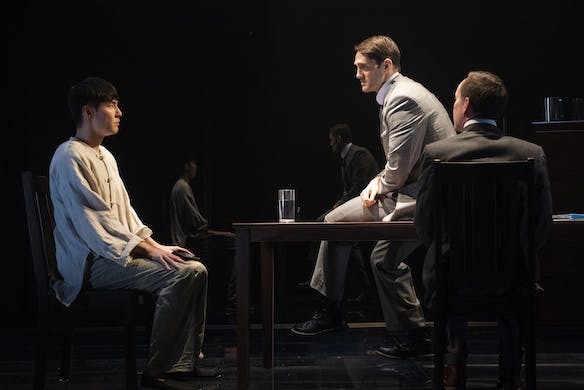Focusing on America’s Troubling Responses to Immigration — More Than a Century Ago
Ultimately, ‘The Far Country’ shows playwright Lloyd Suh is as interested in the resilience of the human spirit as he is in the historical atrocities that have challenged it.

In “The Far Country,” Lloyd Suh’s graceful, haunting account of several interwoven journeys between rural China and San Francisco in the early 20th century — that is, in the wake of the Chinese Exclusion Act — communication is often quite simple and direct. Yet people can have a difficult time understanding one another, and an even harder time establishing trust.
Some of this has to do with differences in language. In the first scene, set in 1909, we’re introduced to Gee, who claims he was born in the United States but is seeking permission to visit his wife and children in China. As government officials subject him to the rigid, ultimately humiliating interrogation that people of his heritage had to endure at this time, Gee plays the good-humored, self-deprecating foreigner.
Yet when he and his translator confer in Chinese, represented by non-accented English when spoken by the Asian actors in this play, the latter manages to slip in some useful advice. Before we know it, Gee — who’s more cunning, and cynical, than he initially seems, two qualities that are captured in Jinn S. Kim’s discerning performance — has made it to the village of Taishan, where his true intentions are shown. They entail not reuniting a family, but rather breaking one up to form another.
The undertaking of this scheme will expose both the bigotry and the oppression Chinese people suffered in this country after the passage of the 1882 exclusion act that banned most immigration to this country initially for a period of 10 years, though it wasn’t repealed in earnest until 1943. It also illustrates the harsh conditions that led them to seek a better life here regardless.
Gee finds such a searcher in Low, a sensible, stoic woman facing dire circumstances, whose only hope appears to lie in sending her teenage son to California, where he can make a living working in Gee’s laundry operation. “America has been good to me, and it can be good to your son,” Gee assures her. Yet Low, played with unfussy authority by Amy Kim Waschke, has no such illusions. “There is no part of the ill we’re facing that isn’t caused by America,” she retorts.
Even Low cannot envision the horrors that await her son, Moon Gyet, on Angel Island, home to the West Coast’s principal immigration station, where tens of thousands of Chinese and Japanese hopefuls sought entry, and faced deportation, between 1910 and 1940. While the depravity of their living conditions, worse than those of prisoners in civilized places, isn’t physically represented, the actors make Mr. Suh’s darkly lyrical descriptions sting deeply.
We also get to watch, in one particularly excruciating scene, as Moon Gyet struggles to maintain his composure and his wits under relentless questioning. The actor Eric Yang remains seated as Ben Chase, playing the inspector, paces and hovers over him, and another interpreter — a white man this time — faces away from the audience, repeating everything they say.
Clint Ramos’s stark set design and Jiyoun Chang’s purposefully harrowing lighting enhance the tension produced by such interaction. The latter combines with Fan Zhang’s sound and original compositions to provide for some harrowing transitions.
There is also warmth and humor in “The Far Country”; ultimately, Mr. Suh is as interested in the resilience of the human spirit as he is in the historical atrocities that have challenged it. Under Eric Ting’s sensitive direction, Mr. Yang’s Moon Gyet blossoms from an earnest, obedient boy into a young man with his own ambitions and skepticism. He acquires a solid match in a spunky young woman named Yuen, played by an adorable, affecting Shannon Tyo.
Yuen delivers an especially moving monologue in the final scene, though it’s followed, notably, by a sustained silence. We’re reminded that sometimes actions, and expressions, can speak louder than words, in any language.

